SCHRIEVER, La. – Each morning at 10, the hundreds of people who work at the Houma Incident Command Post gather for a daily briefing.
That’s when they get updates on both the mundane and the critical when it comes to trying to contain the BP oil spill off the Louisiana coast.
On Thursday, people were reminded to smoke only in the designated area, and told that those who had been bumped from their coveted hotel rooms because of previous reservations would have to make the daily commute from a hotel in New Orleans, an hour away.
Then the discussion turned more urgent. The good news was that a controlled-burn unit, led by Coast Guard Master Chief Petty Officer Richard Madore of South Portland-based Sector Northern New England, had set a record for a controlled burn of spilled oil: 11 hours and 48 minutes.
The bad news was that the oil in the Gulf of Mexico was moving northeast, right toward the Mississippi, Alabama and Florida coasts.
“Mr. Blob continues to grow,” said Mike Utsler, BP’s man in charge at ICP Houma.
The daily briefing is part informational and part inspirational, meant to keep the roughly 1,100 Coast Guard, federal and state government workers and private contractors on task. They are working 12- to 14-hour days. Stifled yawns and drooping eyelids were a common sight at Thursday’s briefing.
Everyone involved is trying to contain and clean up the oil that’s spewing into the Gulf from the remains of BP’s Deepwater Horizon rig, which exploded April 20 off the Louisiana coast.
A half-dozen of the workers at ICP Houma, one of four command posts set up across the affected states, are Mainers or from right next door.
Coast Guard Capt. James McPherson of Portsmouth, N.H., and Cmdr. Paul Wolf of Scarborough, members of Sector Northern New England, have been here since June 2, working in external affairs.
Marine Science Technician Chief Ann Logan of Westbrook is directing oil-skimming boats.
Coast Guard Lt. Nicole Auth, who grew up in Lamoine and whose family lives in Ellsworth, is an aide to Capt. Roger Laferriere, the top government commander at the post.
Ginger McMullin of Scarborough, an oil spill modeling expert for the Maine Department of Environmental Protection, has been helping to map the oil spill since June 1. Seth Barker, a mapping specialist for Maine’s Department of Marine Resources, just arrived to do similar work.
They work in an airy BP training building about the size of a college sports complex. Since the spill, the BP site has become a campus of portable buildings and remote parking lots to accommodate all of the workers.
The teams are organized by specialty in various areas of the complex. The operations people who direct all of the boats and cleanup crews wear red vests. The planning people wear blue. Green is for the finance people, yellow for information technology support and orange for logistics.
The whole scene is reminiscent of the oil spill drill that was based at Portland’s Holiday Inn by the Bay and Portland Harbor in March. Many of the people who participated are now at ICP Houma.
People generally sit in rows behind banks of computers, directing supplies, boats and cleanup crews where they are needed. Although the work lacks the physical and visual drama of that being done in the field, people here say they have the same feelings of urgency.
“We are in the rescue business, and they are in need of rescuing down here,” Wolf said.
People here say they are making progress. Madore, who’s in charge of the controlled-burn unit, keeps track of how many barrels of oil are burned off the surface of the Gulf each day.
He directs a fleet of 20 shrimp boats, six support boats and two command-and-control boats. The shrimpers corral the oil on the surface with booms. Then two workers in a motorized skiff light the oil with flares.
“They love that job,” Madore said.
Flames shoot up 60 feet, and black smoke billows for hours. “The longer the burn, the cleaner,” Madore said.
His team has burned between 103,000 and 146,500 barrels of spilled oil to date.
Across the room from Madore, Logan is directing the post’s 15 skimmers — specially equipped boats that stay out six to seven days at a time, sucking up the spilled oil. She said that at first the boats were collecting only 50 barrels a day, but now they are scooping up 5,000.
As a planning person, McMullin works in another part of the building, plotting the movement of the oil spill. Like other Maine government workers who are responding to the spill, she is being paid her usual hourly rate, which BP has contracted to pay.
“In the 20 years I have been in DEP, this is the first time I will get overtime,” she said.
McMullin said she has been struck by the fellowship at the command post. She knew some of her co-workers from the drill in Portland in March. “People are very good to each other,” she said.
Auth, the commander’s aide, was just finishing a vacation in Alaska with her husband when she got the call to head to Louisiana. She said she was happy to interrupt her trip to help out. Normally, she would be inspecting boats in Hawaii, where she is stationed.
Not that inspecting boats in Hawaii is boring.
“But I would love to be based in Maine,” she said, “where there are lots of wooden boats.”
Staff Writer Beth Quimby can be contacted at 791-6363 or at:
bquimby@pressherald.com
Send questions/comments to the editors.


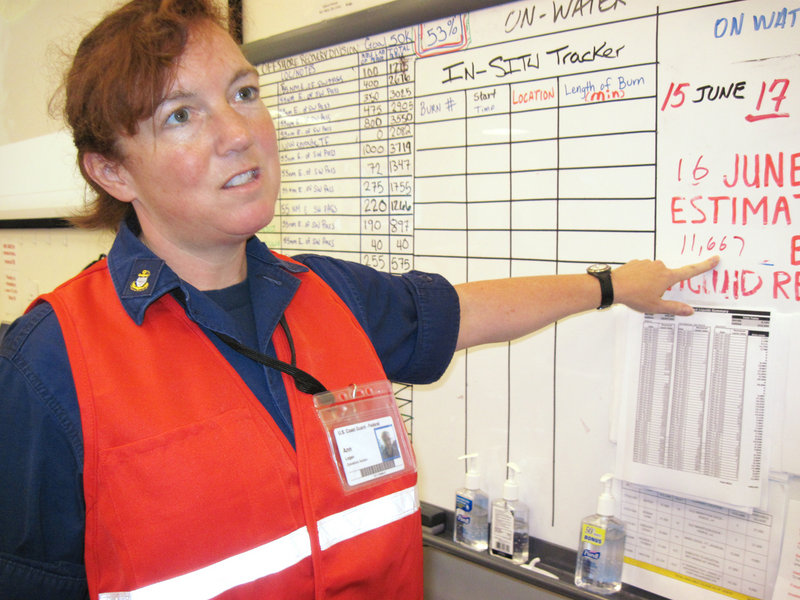
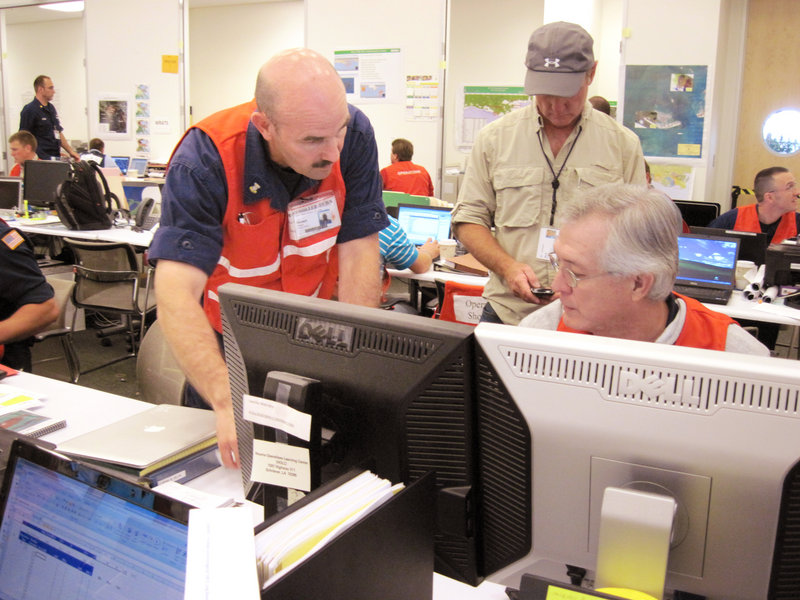
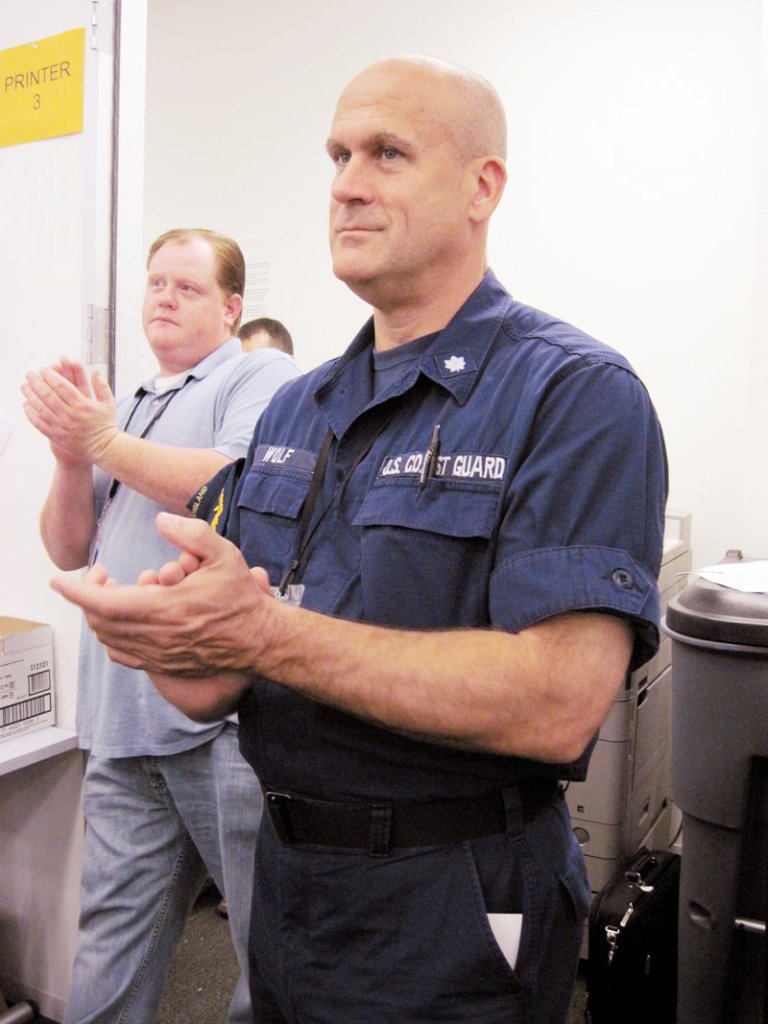
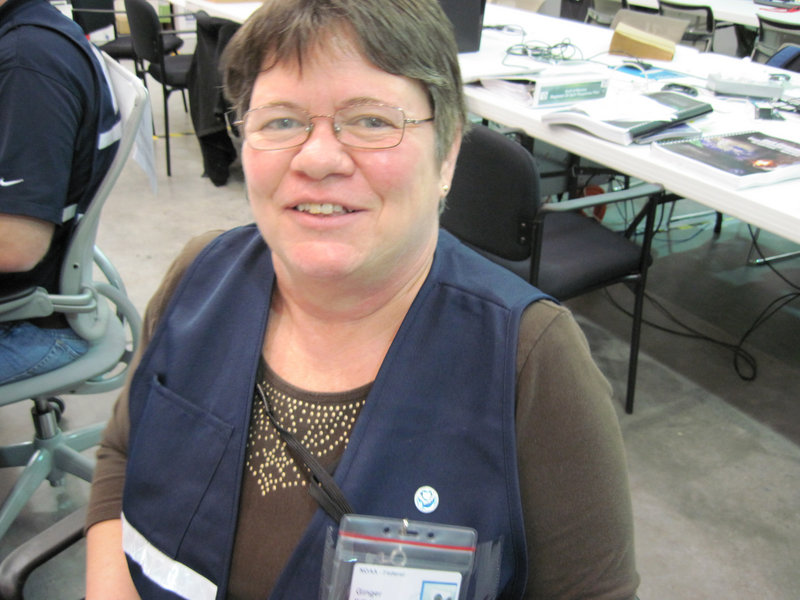
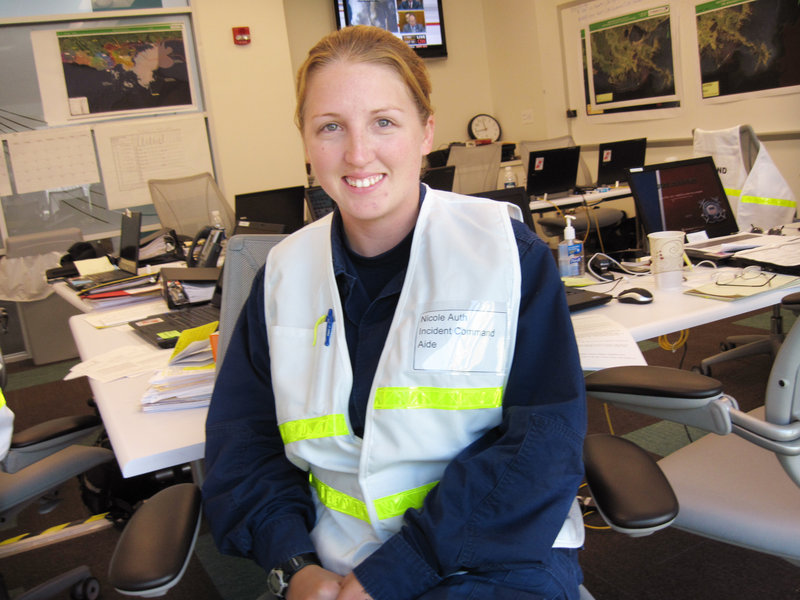

Success. Please wait for the page to reload. If the page does not reload within 5 seconds, please refresh the page.
Enter your email and password to access comments.
Hi, to comment on stories you must . This profile is in addition to your subscription and website login.
Already have a commenting profile? .
Invalid username/password.
Please check your email to confirm and complete your registration.
Only subscribers are eligible to post comments. Please subscribe or login first for digital access. Here’s why.
Use the form below to reset your password. When you've submitted your account email, we will send an email with a reset code.